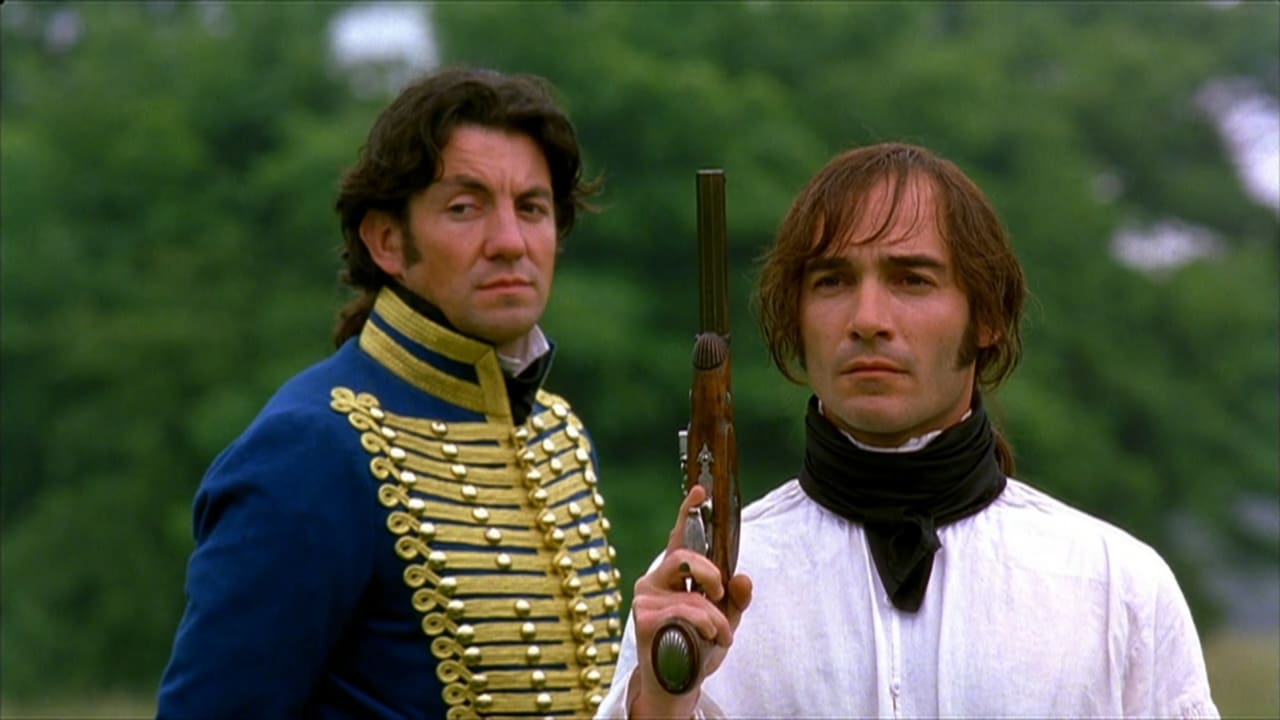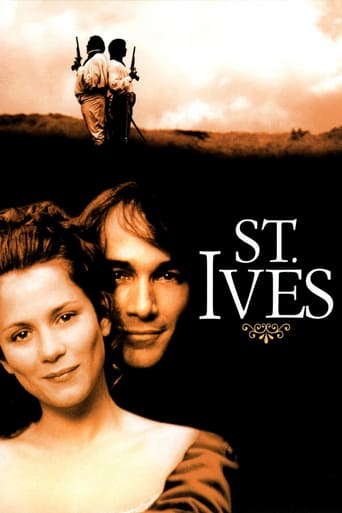

the atmosphere is the first motif to see it. and the performances. and the story. and, not the last, the flavor, well known, of a sweet - bitter old fashion comedy. a film about war, friendship and love. and the best actors for translate on the screen a story of R.L. Stevenson who becomes special. at the first sigh, an easy film. mix of history, adventure and a great job of Robert Grant. in fact, an oasis. one of the most necessary. for redefine the small, significant small things.
... View MoreWhat a fun movie St. Ives is. It reminds me of the type of film made during the 40's. Classic story, rounded off by characters and a plot that is neither over dramatic nor overtly complicated. In fact it isn't over anything. Robert Lewis Stevenson's story - here adapted for the screen - reads like Jane Austen for men. We do get a tale that has a romance at its heart, but there is plenty of fun too: battle scenes (sort of), prison escapes, mistaken identities, swordplay, and the funniest line I've heard in years: "Only in Scotland would guests be announced by name at a masked ball." There is much hilarity, hardship, and not a little heartbreak as St. Ives tries to fight and find his way back to a family and life he barely knew.The cast is absolutely stellar with the too infrequently seen Jean Marc Barr absolutely perfect in the title role. Anna Friel is a refreshing delight as the resourceful Flora and Miranda Richardson nearly walks away with the movie as her wise and worldly, been there and seen-it-all Aunt Susan. Richard Grant provides comic relief of the highest order.This is not going to be the greatest movie anyone has ever seen, but its charms are undeniable and the entire film fairly bristles with an energy that bursts with life.
... View More*a possible SPOILER or two*yes, it was fun to watch. i like all the actors in it, especially Richard E. Grant and Jason Isaacs. the charcters were delightful and the set was marvelously done. bits of the storyline were choppy at times, but that can be forgiven.jaques st. ives, the main chacter of the film, was very very fun to watch. a handsome young man with a cocky attitude and noble heart who manages to find his long-lost grandfather and brother. now the brother, alain, was the bad guy of the film, but ultimately you felt pity for him.SPOILER: funny story: near the end, when he was dying and apoligizing and jaques was bending over him my mom kept saying "what're you doing!? don't get too close, you damn fool!" i think she thought that alain, the pitiful malicious brother who is out to kill jaques and who realizes his mistake in the end and shows brotherly love (funny how a sword point in your gut can do that), was suddenly going to jump up and kill them all. personally, i think that would have been a cool ending, but i'm tired of seeing jason isaacs die every time he plays a character i like (namely, a villian).i would recommend this film if you want something light and fun, with a couple cool sword fights and cute love story.
... View MoreFirst of all, 'St. Ives' the film is only fairly loosely based on the Robert Louis Stevenson story of the same name, but for once, this is not a criticism. The original novel was a work-in-progress, unfinished at the author's death, and in freely adapting it and giving it an ending, the film-makers have brought to life some endearing characters who, although different from Stevenson's originals, would, I am sure, have charmed and amused him.It is 1813: Capitaine Jacques de Kéroual de Saint-Yves is a Breton aristocrat, orphaned by the Revolution's guillotine, now serving as a hussar in Napoleon's army. We meet him going out for the evening, claiming that since a hussar who is not dead by 30 is "a blackguard", he, at 34, is now "on borrowed time"! Certainly, as he faces a string of challenges to duels, our dashing hero seems in danger, but a surreal prank on his Colonel provides him a way out of the duels and into the bed of a beautiful courtesan/singer. Unfortunately, it also results in losing his commission... Further misadventures result in him being taken prisoner by the British, and sent to a POW camp in a Scottish castle.While carving toys and boxes, Jacques catches the attention of Flora, the young niece of Miss Susan Gilchrist, a well-travelled woman of the world who lives at Swanston Cottage. They fall in love, and most of the story concerns Flora helping Jacques to escape and to find his emigré grandfather, the old Comte. Of course, there is a problem. Jacques' older brother, Alain, a dissolute alcoholic, is - perhaps understandably - far from pleased when Grandfather disinherits him in front of the whole household, the very instant that Jacques has appeared... Cue treachery! There is also an entertaining subplot of the romance between the awkward, naïf but good-hearted Major Farquhar Chevening and Aunt Susan, who has travelled through most of the Ottoman Empire and been a prisoner of the Turks.Even allowing for a natural prejudice in favour of any film in which the heroines share my surname, 'St. Ives' is magic! It combines splendidly swashbuckling swordfights, a balloon-flight, comedy and romantic adventure. I would recommend it to anyone who loves 'the kind of film they don't make anymore' - Fairbanks, Colman, Flynn, & co. The acting is splendid. Anna Friel makes Flora a spirited and appealing heroine, and Jean-Marc Barr is delightful as Jacques, a genuinely lovable hero. Miranda Richardson and Richard E. Grant are already great favourites of mine, and have great fun as Susan and Farquhar, whose relationship runs as a comic counterpoint to that of the leads. As the rakish, scheming, but ultimately tragic Alain, Jason Isaacs shows, as he did more recently in 'The Patriot', that he has the classic swashbuckling style, besides the dashing good looks! Please, please will someone cast him as a *hero* in the genre?!!!My main quibbles with the film concern settings and costumes. In the book, the castle in which Jacques is a prisoner is clearly Edinburgh, but the film, shot in Ireland, Germany and France has 'Highlandised' the setting, making the retention of place names such as Swanston, Inveresk and Queensferry decidedly incongruous. The costumes too are a real hotch-potch, from 1780s through to the period in which it is set. While this would not be implausible with more down-market characters "making do", it seems odd for well-to-do ladies such as the heroines to be wearing 1780s gowns in 1813. Clearly, the costuming decision was æsthetic: these earlier styles are visually far more appealing and elegant than Regency fashions, and they work in the idealised world of the film. As a whole, 'St. Ives' is 90 minutes of pure delight.
... View More